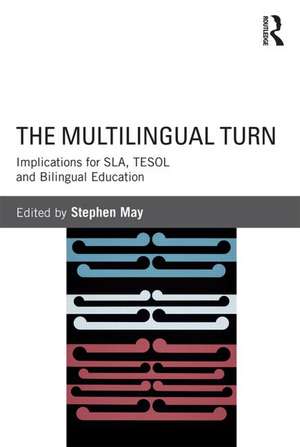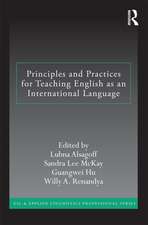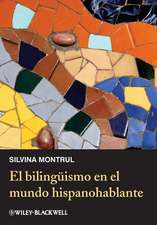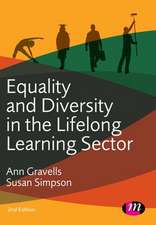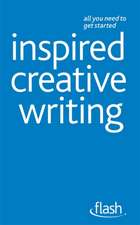The Multilingual Turn: Implications for SLA, TESOL, and Bilingual Education
Editat de Stephen Mayen Limba Engleză Paperback – 30 iul 2013
This volume takes a big step forward in re-situating the issue of multilingualism more centrally in applied linguistics and, in so doing, making more permeable its key sub-disciplinary boundaries – particularly, those between SLA, TESOL, and bilingual education. It addresses this issue head on, bringing together key international scholars in SLA, TESOL, and bilingual education to explore from cutting-edge interdisciplinary perspectives what a more critical multilingual perspective might mean for theory, pedagogy, and practice in each of these fields.
| Toate formatele și edițiile | Preț | Express |
|---|---|---|
| Paperback (1) | 450.03 lei 6-8 săpt. | |
| Taylor & Francis – 30 iul 2013 | 450.03 lei 6-8 săpt. | |
| Hardback (1) | 820.32 lei 6-8 săpt. | |
| Taylor & Francis – 10 dec 2013 | 820.32 lei 6-8 săpt. |
Preț: 450.03 lei
Nou
Puncte Express: 675
Preț estimativ în valută:
86.12€ • 88.20$ • 71.64£
86.12€ • 88.20$ • 71.64£
Carte tipărită la comandă
Livrare economică 18 martie-01 aprilie
Preluare comenzi: 021 569.72.76
Specificații
ISBN-13: 9780415534321
ISBN-10: 0415534321
Pagini: 240
Ilustrații: 1 black & white tables
Dimensiuni: 152 x 229 x 15 mm
Greutate: 0.32 kg
Ediția:1
Editura: Taylor & Francis
Colecția Routledge
Locul publicării:Oxford, United Kingdom
ISBN-10: 0415534321
Pagini: 240
Ilustrații: 1 black & white tables
Dimensiuni: 152 x 229 x 15 mm
Greutate: 0.32 kg
Ediția:1
Editura: Taylor & Francis
Colecția Routledge
Locul publicării:Oxford, United Kingdom
Notă biografică
Stephen May is Professor of Education in Te Puna Wananga, and Deputy Dean Research in the Faculty of Education, University of Auckland, New Zealand. He is editor of the interdisciplinary journal, Ethnicities and Associate Editor of the journal Language Policy.
Recenzii
“This important contribution to educational linguistics… adds a much-needed social perspective to the theory of SLA, English language teaching, and bilingual education. It takes a useful and needed step in moving beyond the monolingual and psycholinguistic biases of researchers in SLA and TESOL.”
Bernard Spolsky, Bar-Ilan University, Israel
"Boundary-breaking, with wonderful width as well as originality, this book is at the cutting edge. The star-studded list of chapter authors are THE experts in their fields of study.”
Colin Baker, Bangor University, UK
“The critical approach to SLA, TESOL, bi- and multilingual education raises much needed questions about the usefulness of subject-bounded approaches to second language teaching. The case for multidisciplinary frameworks is well-made.”
Naz Rassool, The University of Reading, UK
Bernard Spolsky, Bar-Ilan University, Israel
"Boundary-breaking, with wonderful width as well as originality, this book is at the cutting edge. The star-studded list of chapter authors are THE experts in their fields of study.”
Colin Baker, Bangor University, UK
“The critical approach to SLA, TESOL, bi- and multilingual education raises much needed questions about the usefulness of subject-bounded approaches to second language teaching. The case for multidisciplinary frameworks is well-made.”
Naz Rassool, The University of Reading, UK
Cuprins
Introducing the “Multilingual Turn” Ch. 1. Disciplinary Divides, Knowledge Construction, and the Multilingual Turn Ch. 2. Ways Forward for a Bi/multilingual Turn in SLA Ch. 3. Moving beyond “lingualism”: Multilingual embodiment and multimodality in SLA Ch. 4. Theorizing a Competence for Translingual Practice at the Contact Zone Ch. 5. Identity, Literacy and the Multilingual Classroo Ch. 6. Communication and Participatory Involvement in Linguistically Diverse Classrooms Ch. 7. Multilingualism and Common Core State Standards in the US Ch. 8. Who’s teaching whom? Co-learning in multilingual classrooms Ch. 9. Beyond Multilingualism: Heteroglossia in Practice
Descriere
Drawing on the latest developments in bilingual and multilingual research, this volume offers a cutting edge, interdisciplinary critique of, and alternatives to, still-dominant monolingual theories, pedagogies and practices in SLA and TESOL.
